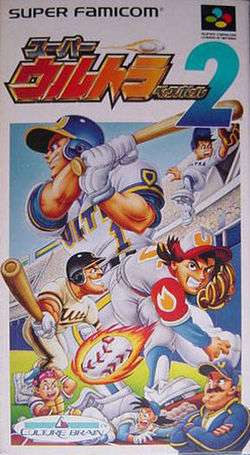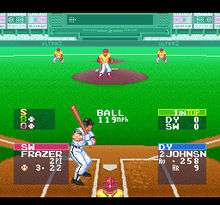Super Ultra Baseball 2
| Super Ultra Baseball 2 | |
|---|---|
 Cover art of Super Ultra Baseball 2 | |
| Developer(s) | Culture Brain |
| Publisher(s) | Culture Brain |
| Series | Ultra Baseball |
| Platform(s) | Super Famicom |
| Release date(s) |
|
| Genre(s) | Sports |
| Mode(s) |
Single-player Multiplayer |
Super Ultra Baseball 2 is the fourth game in the Ultra Baseball (Baseball Simulator in North America) series.
Summary

This video game was released in 1994 for the Super Famicom by Culture Brain in Japan only. The game adds some new features compared to the previous titles.
This game has a new 16-bit engine with much improved graphics, lots of new batter and pitcher edit options and manager/team personalities. According to an issue of Nintendo Power Culture Brain had planned to release this title in North America as (Super Baseball Simulator 1000 2) but canceled its release.
In the game, there are three leagues: Sunny, Paradise and Ultra. Each league has six teams. In the Ultra League, pitchers and batters have special power-ups that boost their abilities which gives the game a surrealistic feel that is rare in the sports genre. Players can even create their own baseball teams and assign special moves to the players that they name themselves. The game can be played in exhibition, season or All-Stars modes.
Though the game was never released in North America, an unofficial English Translation has been created by VX Translations.[1]
Teams
Sunny League: Dynamics, Switches, Girls, Eggs, Candles, Monsters
Paradise League: Lightning, Flames, Quails, Birthdays, Blue Birds, Hearts
Ultra League: Digital Bits, J-Leagues, Mules, Blacksmiths, Stones, Culture Brains
Baseball Simulator series
These Baseball titles included some form of "Super League" where pitchers and batters would have special abilities.
- Baseball Simulator 1.000 (1989, NES), also known as Choujin Ultra Baseball
- Super Baseball Simulator 1.000 (1991, Super NES), also known as Super Ultra Baseball
- Ultra Baseball Jitsumeiban (1992, SNES) NPB licensed.
- Super Ultra Baseball 2 (1994, SNES)
- Ultra Baseball Jitsumeiban 2 (1994, SNES) NPB licensed.
- Ultra Baseball Jitsumeiban 3 (1995, SNES) NPB licensed.
See also
References
- ↑ Edward (2009-04-25). "SNES VX TRANSLATIONS: Super Ultra Baseball 2 Complete English Patch (1.00)". Vxtrans.blogspot.com. Retrieved 2012-10-30.